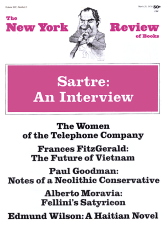In response to:
African Hitler from the January 1, 1970 issue
To the Editors:
Readers who are familiar with Edmund Leach’s public malevolence will not be misled by his irresponsible review of my book, Terror and Resistance, in the January 1, 1970 issue. The scant connection between his comments and even the passages he selects for quotation indicates that the review merely exploits the book to ventilate Leach’s professional obsessions. From his review it is not possible to learn about the nature and direction of my inquiry. Actually, the book explains the typical regime of terror as one social choice among several historically possible forms of counter-resistance, and the material on Zulu history—five chapters out of fifteen and less than half the pages—is a lengthy case study that fits into a larger analytic framework; it is only one part of a comparative inquiry into the types of counter-resistance. I have examined terroristic regimes as cooperative systems that depend on social choices, teams, and staffs, and have demonstrated why those systems cannot be explained either by impersonal forces or by the personalities, the solitary decisions, or the putative charisma of the despots. I have also examined alternative political forms, which deal with resistance and with crises of integration by methods other than systematic violence.
The major part of Leach’s attack is a challenge of my competence to interpret ethnological information. He thinks I have been deluded by the defects and biases in my sources, and the reader is expected to accept that allegation on the credit of Leach’s more-expert-than-thou arrogance and a few clichés about the old European observers in Africa. His prejudice that nineteenth-century sources are uniformly simple and uncomplicated allows him to enjoy an attitude about the sources in general without knowing anything about my sources in particular. What he writes about the old observers is generally true: ‘Their contacts were with the leaders of the communities concerned, and, for the most part, they worked through interpreters. Even those few who spoke the native languages never moved far from the royal court.” About some of my sources, however, it is particularly false. Anyone even slightly acquainted with the papers of Henry Francis Fynn and the journals of Nathaniel Isaacs knows that they spoke Zulu—indeed, Fynn worked as an official interpreter for a time. Moreover, they wandered all over Zululand, visiting humble kraals as well as the royal court. Some Europeans even wondered about Isaacs (who wore an old blanket when his European clothes deteriorated and who disappeared into the bush for months at a time), suspecting that he might have gone native. There are plenty of problems with those sources—bias, inconsistency, historiographic issues of many kinds—and I agonized over them for years. But Leach’s attack is based on ignorance in particular and prejudice in general, which are not confined to sources on the Zulu. To dismiss the contributions of George W. Harley—information gathered over decades and published in the Papers of the Peabody Museum—as the work of no more than “a heavily biased medical missionary” would seem unreasonable, to say the least, to anyone who has studied the Poro Society of West Africa.
Besides impugning my grasp of anthropological literature, Leach distorts my argument thoroughly, often skipping from one part of the text to another and drawing “inferences” that do not exist. A prominent example of confusion, as well as distortion, is his misrepresentation of what I say about social solidarity and its relation to the duration of terrorism, which he manages to put together with an entirely different point I had made about Russia, China, and Cuba. I do not say, as he contends, that “the Soviet Union, Communist China, and Cuba are all countries in which despotic terrorism flourishes, or has recently flourished…” On the contrary, in an early chapter, I mention them to make distinctions between terrorism and other kinds of violence; I go out of my way to indicate that Cuba is not a terroristic regime.
This kind of misrepresentation does not stand alone. It would take more space than I am allowed to straighten all the crooked threads from which Leach fabricates his caricature of the book.
E. V. Walter
Brookline, Mass.
This Issue
March 26, 1970



